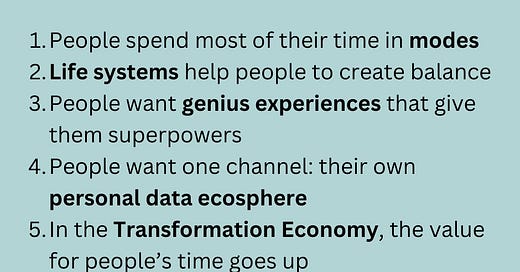Dear Friends,
It’s exciting to be starting section 2 of the Experience Strategy Book project. Below is the section introduction. More to come!
Section 2: How Human Behavior is Changing
And what strategists can do to ‘win’ customers
Section 2 Overview
In the first five chapters of this book, I presented the four principles that companies need to focus on for value creation. The following chapters focus on different challenges that companies will face in the future—from customizing experiences to determining how much intelligence to include in an experience—how to think about those challenges, and how to develop a successful experience strategy to address them. Each chapter is built around over a decade of research conducted our team at Stone Mantel while working with thousands of consumers.
Now, let’s apply those principles to specific phenomena that are happening right now. Or better yet, let’s show how these principles work in people’s lives.
I will present to you four Points of View (POVs) for how human behavior will change in the near future. You can take the insights I share and apply them immediately to your company. The insights are as follows:
People will spend most of their time in modes
Life systems help people to create balance
People want genius experiences that give them superpowers
People want one channel: their own personal data ecosphere
In the transformation economy, the value for people’s time goes up
Chapter Six is about modes. Modes are a mindset and a set of behaviors that people get into temporarily. They are the predominant way that people behave today. In this chapter, I will share how companies can leverage modal behavior to create individualized experiences.
Chapter Seven is about life systems. Life systems keep people in balance. Life systems provide structure. People rely on their life systems to provide a check on the crush of decisions they make daily. Life systems allow them to automate their responses.
Chapter Eight is about genius experiences. We are at the beginning of the Intelligent Era when people will have access to tools that can almost think for themselves. AI will change people’s expectations for all experiences, but especially those that are associated with the whole job to get done.
Chapter Nine is about personal data ecospheres. As people become more comfortable with AI and contextual data, and as they live life by getting into modes and creating life systems, their expectations for channels, tools, and environments will change.
Chapter Ten about the transformation economy. As Joe Pine and Jim Gilmore predicted we are moving into an economy where value is associated with transformations. This chapter shows how experience strategy creates the foundation for transformations.
To be continue …





